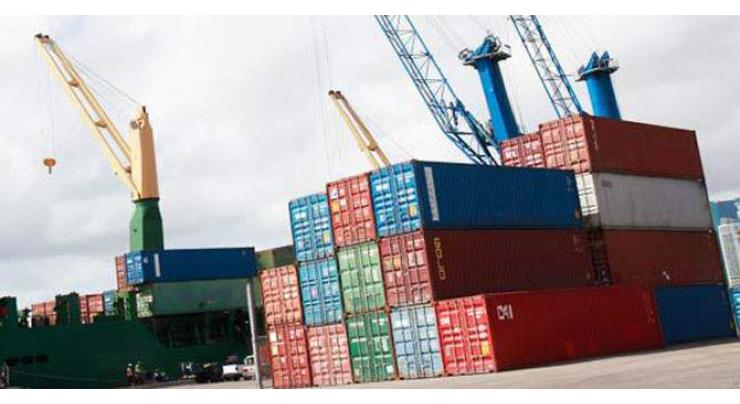
Experts Stress On Need To Reduce Regulatory Burden On CSEs
Rukhshan Mir (@rukhshanmir) Published October 23, 2018 | 10:05 PM

Experts here at the policy component launch of 'Developing Inclusive and Creative Economies (DICE) Pakistan' on Tuesday said the country had a thriving startup and entrepreneurship culture with creative and social enterprises (CSEs) contributing significantly to national income, employment and poverty reduction.
ISLAMABAD, (UrduPoint / Pakistan Point News - 23rd Oct, 2018 ) :Experts here at the policy component launch of 'Developing Inclusive and Creative Economies (DICE) Pakistan' on Tuesday said the country had a thriving startup and entrepreneurship culture with creative and social enterprises (CSEs) contributing significantly to national income, employment and poverty reduction.
However, there was a dire need of reducing regulatory burden on the CSEs as many of them were unable to grow due to excessive regulation, high cost of doing business, distortive tax regime, and lack of credit facilities, they observed.
The event was organized by Sustainable Development Policy Institute (SDPI) in collaboration with British Council and United Nations Economic and Social Commission for Asia and Pacific.
DICE is a multinational programme that supports the development of creative and social enterprises in the UK and five key emerging economies which include Brazil, Egypt, Indonesia, Pakistan, and South Africa.
Joint Executive Director, SDPI, Dr. Vaqar Ahmed said despite significant and growing contribution of Creative and Social Enterprises (CSEs) sector to the overall economy of the country, the sector is facing many challenges on regulatory and tax regime fronts.
CSEs can be incentivized by allowing a quota in public procurement. He suggested that the SME policy of State Bank of Pakistan can also demand the commercial banks to take a risk on social entrepreneurs and facilitate credit. The Centre for Social Entrepreneurship at Planning Commission can also seek inputs from social entrepreneurs and ask them regarding their issues related to intellectual property, labour, environment, and several municipal laws, he added.
Dr Vaqar said the planning and development departments at the provincial governments should recognize the social and creative enterprise sector and how this can contribute to sustainable development goals (SDGs).
The growth strategies of provincial governments can facilitate social start-ups through their development budgets. SECP laws may also encourage impact funding and crowd sourcing of funds towards social enterprises, he added.
Tristan Ace, head of the British Council's Social Enterprise programme across Asia, said that given the potential to grow, there is a need of building an enabling environment for SCEs to flourish in emerging economies such as Pakistan. He said that policy development for SECs sector is very hard, but the impact on the ground is larger and significant. He said that 'Developing Inclusive and Creative Economies (DICE) Pakistan' program aim to foster inclusive growth and progress on the Sustainable Development Goals (SDGs). DICE program takes an innovative, cross-sectoral approach which draws on UK expertise in the creative and social economies, he added.
Different working groups at the end suggested measures to develop a comprehensive policy for CSEs sector. On regulation and certification component of the proposed policy, different stakeholders suggested that the regulatory regime should be simplified to ensure ease in doing businesses. On tax, incentives and procurement component stakeholders suggested that the new start-ups and CSEs should be given special tax rebates for at least 5 years to thrive.
On funding and finance component of policy, they suggested that for the ease of international investors, there should be a toolkit containing guidelines for targeted investments. And on culture, understanding and awareness component of the policy, they suggested consolidation of data at one platform and effective use of social and digital media for dissemination of requisite information regarding CSEs.
Related Topics
Recent Stories

Currency Rate In Pakistan - Dollar, Euro, Pound, Riyal Rates On 26 April 2024

Today Gold Rate in Pakistan 26 April 2024

ICC Womens T20 World Cup Qualifier, Match 2: Ireland Women open with Comfortable ..

Robinson, bowlers help New Zealand go 2-1 up against Pakistan

Shahzeb Chachar to hold khuli kachehri on April 26

Heatwave amid Israel's aggression in Gaza brings new misery, disease risk

Tourism must change, mayor says as Venice launches entry fee

Court adjourns Judicial Complex attack case till May 17

Nasreen Noori’s book ‘Popatan Jahra Khwab’ launched

Wafaqi Mohtasib inspection team visits Excise and taxation office

AJLAC announces 5th Conference titled ‘People’s Mandate: Safeguarding Civil ..

Pak-US officials engage to enhance trade, investment ties
More Stories From Business
-
Exchange rates for currency notes
2 hours ago -
Foreign exchange rates
2 hours ago -

Currency Rate In Pakistan - Dollar, Euro, Pound, Riyal Rates On 26 April 2024
2 hours ago -

Today Gold Rate in Pakistan 26 April 2024
3 hours ago -
Chinese minister felicitates Ahsan Iqbal on reappointment as Planning minister
12 hours ago -

Pak-US officials engage to enhance trade, investment ties
13 hours ago
-

Stocks fall as tech shares sink, US economy slows
13 hours ago -

Higher taxes, awareness help decrease cigarettes sale in Pakistan
14 hours ago -

Ahsan Iqbal chairs CPEC JWGs, 13th JCC review-meeting
15 hours ago -

Industries Minister recommends urea fertilizer import to stabilize prices and supply
15 hours ago -

Honda announces US$11 bn EV battery and vehicle plant in Canada
15 hours ago -

Zhao Shirin calls on Punjab Industries Minister
15 hours ago














